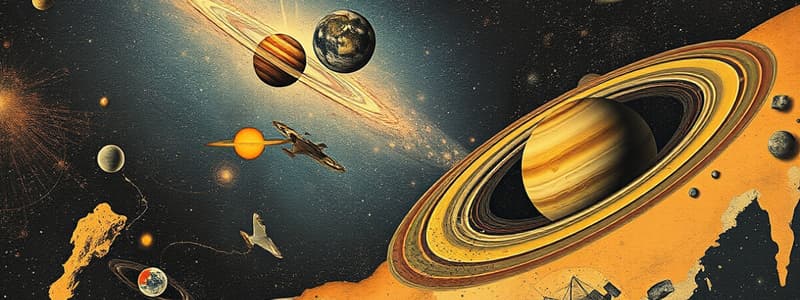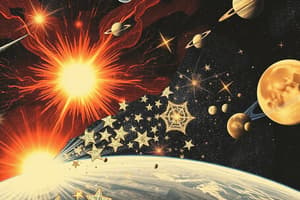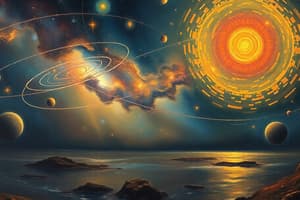Podcast
Questions and Answers
Which process is primarily responsible for the formation of solar systems from interstellar gas and dust?
Which process is primarily responsible for the formation of solar systems from interstellar gas and dust?
- Stellar nucleosynthesis
- Gravitational lensing
- Nuclear fusion
- Accretion (correct)
What is one of the key contributions of Indian astronomical research in the study of stars?
What is one of the key contributions of Indian astronomical research in the study of stars?
- Discovery of new planets
- Development of advanced telescopic technology (correct)
- Mapping of the cosmic microwave background
- Identification of dark matter
Which statement about stars is most accurate regarding their lifecycle?
Which statement about stars is most accurate regarding their lifecycle?
- All stars eventually become black holes.
- A star's final state depends on its initial mass. (correct)
- Stars do not undergo any chemical changes during their existence.
- All stars have the same lifecycle before they become supernovae.
What is an astronomical experiment primarily focused on?
What is an astronomical experiment primarily focused on?
Which phrase best describes the 'Big Bang Theory'?
Which phrase best describes the 'Big Bang Theory'?
What is a primary characteristic of the nebular hypothesis in relation to solar system formation?
What is a primary characteristic of the nebular hypothesis in relation to solar system formation?
Which statement regarding the lifecycle of stars is least accurate?
Which statement regarding the lifecycle of stars is least accurate?
What is a common objective of astronomical experiments conducted by researchers?
What is a common objective of astronomical experiments conducted by researchers?
Which aspect of Indian astronomical research has notably advanced the understanding of celestial phenomena?
Which aspect of Indian astronomical research has notably advanced the understanding of celestial phenomena?
What role does dark matter play in the formation of galaxies?
What role does dark matter play in the formation of galaxies?
Flashcards are hidden until you start studying
Study Notes
Formation of the Universe
- The universe began approximately 13.8 billion years ago with the Big Bang, a massive expansion from a singularity.
- Initial states involved extreme temperature and density, leading to the formation of fundamental particles.
- After about 380,000 years, the universe cooled sufficiently for atoms to form, allowing photons to travel freely, creating the Cosmic Microwave Background radiation.
Formation of the Solar System
- The solar system formed about 4.6 billion years ago from a rotating disk of gas and dust known as the solar nebula.
- Gravitational forces caused particles to clump together, forming planetesimals, which eventually coalesced into planets, moons, and other bodies.
- The formation of the Sun occurred at the center of the nebula, while terrestrial planets formed closer to the Sun and gas giants formed farther away.
Stars
- Stars are formed in nebulae, dense regions of gas and dust where gravity triggers nuclear fusion in the core.
- The life cycle of a star varies based on its mass; smaller stars become red giants before shedding outer layers, while massive stars may explode as supernovae.
- Post-explosion, massive stars can become neutron stars or black holes, while lighter stars leave behind white dwarfs.
Astronomical Experiments
- Experiments in astronomy often involve telescopes, both ground-based and space-based, to collect and analyze light from celestial objects.
- Astronomical observations help determine distances, chemical compositions, temperatures, and motions of stars and galaxies.
- Experiments also include the detection of gravitational waves and cosmic background radiation, providing insights into the universe's structure and evolution.
Indian Astronomical Research
- India has made significant contributions to astronomy, with institutions like ISRO (Indian Space Research Organisation) leading notable space missions.
- The Mangalyaan Mission (Mars Orbiter Mission) marked India's first interplanetary mission, demonstrating capabilities in deep space exploration.
- The Indian Institute of Astrophysics conducts extensive research on stellar evolution, cosmic microwave background, and astronomical instrumentation.
Studying That Suits You
Use AI to generate personalized quizzes and flashcards to suit your learning preferences.



